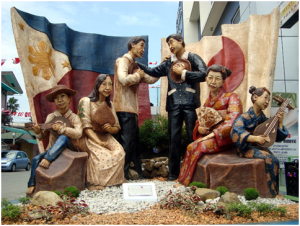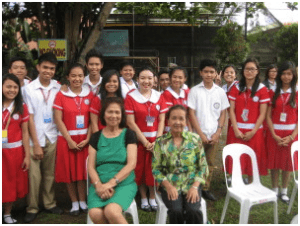Achievement of PNJK in Thirty-Three (33) Years of Existence, A Showcase of our Contribution to the Progress of Society, Now and Onward. Our PNJK compound is becoming the tourist spot in Davao City. Proof of this is the influx of our friends coming from Japan. The number of visitors that came to see PNJK compound as recorded in the PNJK files and identified in 2012 is listed below, to wit:
- Tatsuo Kitagawa who was accompanied by Consul Kazuhiko Anzai of the Consular Office of Japan in Davao City;
- Shun Onno, a visiting Professor of MKD. He is the Professor of Dept. of Global Citizenship Studies;
- Akira Ishioka and Yukihiro Kusabe Syachou of Serei;
- Makoto Hidaka-Shimura of Chubu-Gakuin Junior College;
- Consul Toru Ishii, First Secretary and Consul of the Embassy of Japan in Manila and Head of Visa Section;
- Nippon Izokukai Group consisting of 22 members who are Japan war Bereaved Families Association inspected our Polyclinic;
- Yurichiro Miyazaki, Masumi Nishio, Hiroyuki Tair Yasuhiro Shoda;
- Africa Latin-American Association, an NGO based in Japan. Members would like to learn more about the people who are opposed to nuclear power;
- Sister Goto from Misono Jogakuin Junior & Senior High School, Japan and Fr. Shushigawa of Easter Village, Kidapawan City. The Group observed our Nihongo Classes and was able to witness portion of our RP-Japan Festival.
Accomplishments and Activities in Year 2012:
On January of 2012, we started the discussion on the possibility of putting up another PNJK-IS school building in Calinan. Having resolved on the beneficial effect of embarking into this new project, the construction started, was completed in June 2012 and is currently used by students thereat.
The Japan-Philippine Industry Council, one of our benefactors and PNJK Inc. held two joint meetings in2012, one in February and the other one in November. Our sponsors will continue extending assistance to our members. We have maintained and solidified the good relationship with the members of JPIC.
In compliance with legislated law, we established the grievance committee: The task is to receive complaints against erring PNJK employees, conduct investigation and submit recommendation to the Board of Directors.
The Consular of Japan in Davao City, in 2012 has been in constant communication with our office that in one occasion it requested us to participate in the Samal Festival held on May 18, 2012, to reinforce its manpower. PNJK Inc., PNJK-IS and MKD staffs and teachers gladly participated and in fact the audience in said event was in awe by our colorful presentation.
The Ireisai Celebration, similar to our all Souls Day, was jointly held with the Consular Office of Japan in Davao City on August 12, 2012. Participants present were the Japanese Community, The Nikkei Group, teachers, professors and staff of both PNJK-IS and Mindanao Kokusai Daigaku.

From October 2 to 5, 2012, we observed the RP-Japan Festival. The first day was reserved for free medical consultation offered by PNJK Polyclinic under the leadership of Mrs. Iwamoto. There were physical examination and other health services rendered with minimal fee. PNJK-IS and MKD took care the academic and cultural competitions, Nihongo speech and Balak contest, Ikebana arrangement, Yukata wearing, Tea Ceremony and even Cooking Japanese Food. Highlighting the week-long event is the holding of the Bon-Odori Festival. Everyone wore kimono, yukata and Hapi.
During the General Assembly in 2012, we started the Mortuary Aid Program. Only few had contributed and our appeal to everyone is to be part of the program. Only (30) members joined the program. Currently we have a total sum of P9000.00 kept in the bank. As agreed, P50.00 from each contributor will be extended to any deceased member and this amount will be replenished every general assembly. Last year there were reported descendants who left ahead of us. Unfortunately they were not among those who contributed to the mortuary aid program.
To our members who are in their prime stage, kindly stay fit and healthy because the 2nd generation is the only principal person that can be entertained by our legal group in supplying vital data. Their existence is so important for shuuseki petition before the Family Courts in Japan. Without them there will be no chance for those who have no koseki to go to Japan, unless a new law is passed, allowing the next generation to give data needed to be legally recognized.
There are those who might be candidates to a group tour in August 2013. Your paper must be clear, not corrected by yourself or by anyone good in employing irregular corrections. Your witness must be credible. You need to present concrete evidence that will establish your affiliation with your Japanese ascendants. You will be notified if chosen by PNLSC Japan to be part of the group tour. Last year 2012, four shuuseki petitions were approved by the Tokyo Family Court. Two from Davao: Mr. Carlos Toshimitsu and Enrique Sagaki Tanimoto. Mrs. Aguilina Nagamine from Iligan is now recognized and one from Iloilo Evelyn Akamine. This is the result of the joint effort of Atty. Kawai, PNLSC and PNJK, INC.
New policy in Japan that took effect in July 2012 is as follows: Resident visa is given to descendants for three to a maximum of five years. If you are not a resident in Japan, you will be entitled to only one year resident visa. Re-entry permit is not necessary for as long as you go back to Japan within one year. However, if you stay more than one year outside of Japan you need the so called re-entry visa.
Attached to the report is the classification of Category A and B. This is the report of Ms. Nelma Adachi in May 2012. Kindly go over the same for any one of you in the audience may fall under the classification and the explanation is clear.
For the information to those interested to study Nihongo Language, we have been conducting classes in Japanese Language for the past months. Kindly call our office and look for April. Free lesson during Saturdays is conducted to our descendants who are Category C. What you only need is buy the reference books that are available in the office. For those who are due to leave for Japan, minimal fee is collected to pay our skilled teacher (s).
Thank you for your time and may we have another fruitful year for 2013. God bless.


 NEW BUILDING
NEW BUILDING


